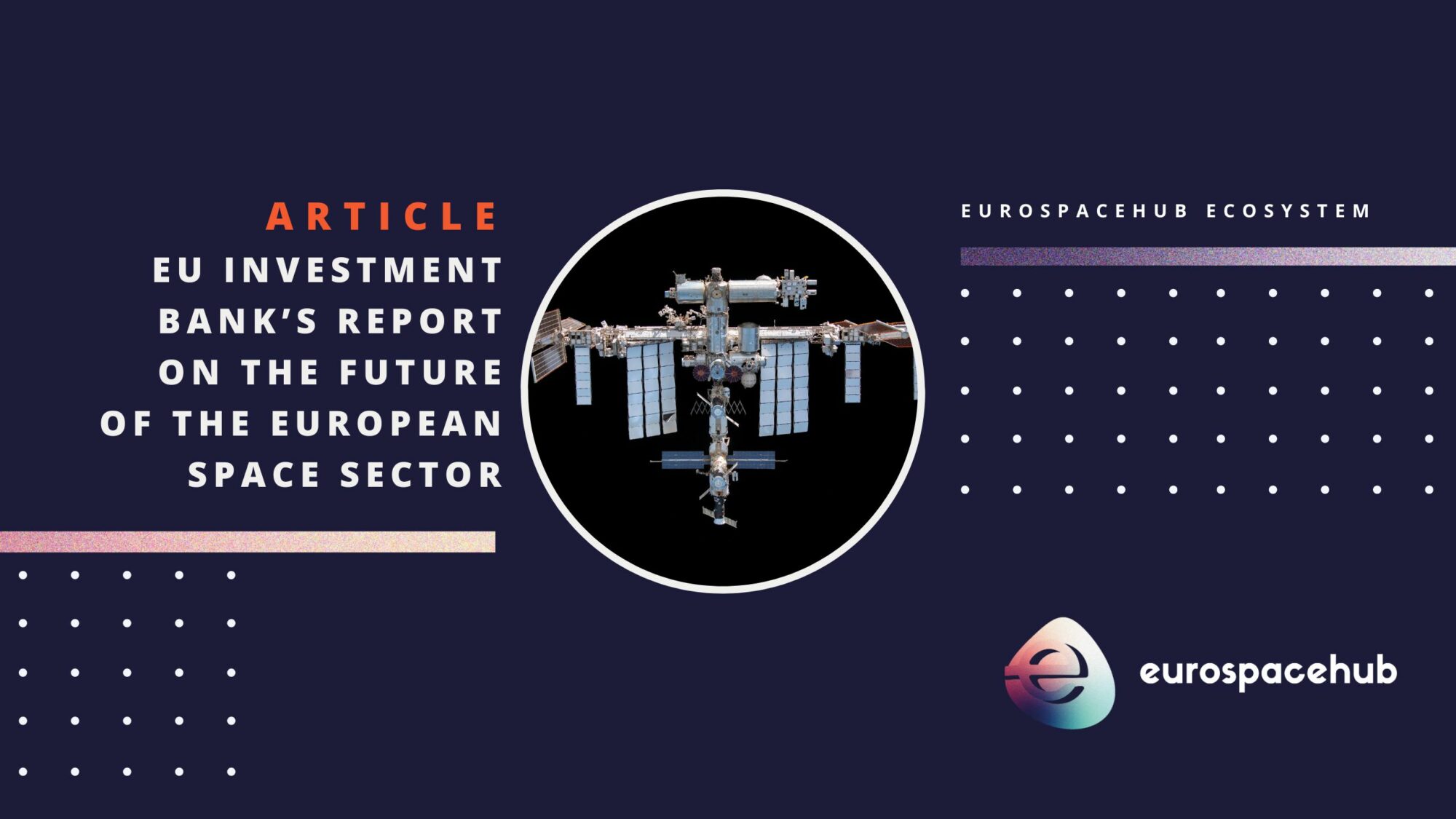The European space sector is an innovative ecosystem that is strong and getting stronger. The on-going development of the sector, especially in regards to the transition towards a more equitable private-public balance that includes room for a dynamic ‘New Space’ economy. In anticipation of this transformation and with the intention of accelerating its growth, the Innovation Finance Advisory group worked together with the European Investment Advisory Hub under the umbrella of the European Investment Bank’s (EIB) advisory services to produce a 162-page report on the current status of the space sector in Europe, and what we might be able to anticipate in the coming decades. EuroSpaceHub has summarised the findings of this in-depth study for you below, ranging from the biggest challenges to new space actors to recommendations for the future.
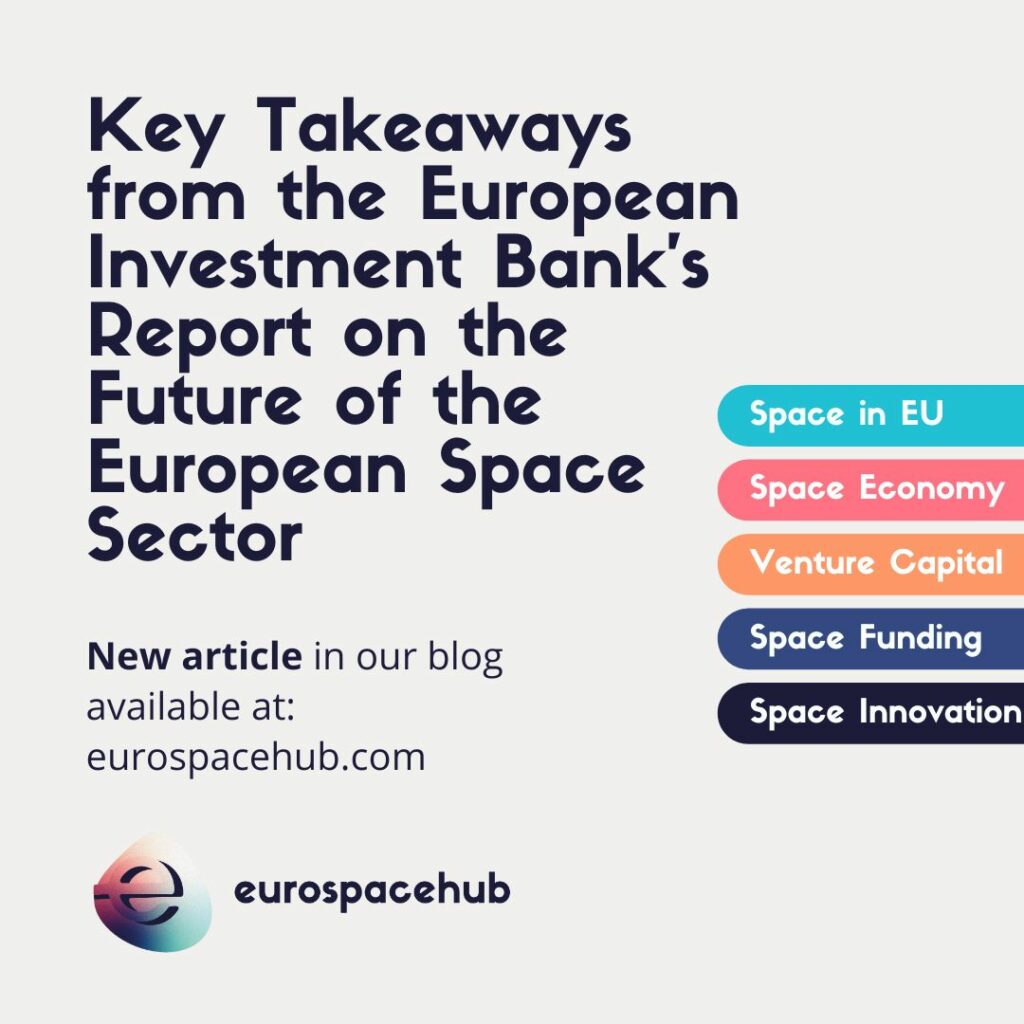
The bolstering space sector in Europe has quickly taken centre stage for those engaged in international innovative projects both inside and outside of the continent, mostly due in part to the EU’s policy focus in this area as well as a renewed entrepreneurial spirit and noteworthy technology developments. The European space economy is strongest in its satellite navigation and Earth observation programmes, with satellite services representing around 37% of the entire global space economy. As was a key topic of discussion at the EuroSpaceHub Ibiza Forum 2023, the degree of accessibility that private and commercial actors have to space technologies has rapidly increased in the past two decades. The efficiency and low-cost development of Cubesat and nanosatellite spacecrafts are primarily responsible for the aforementioned explosion of satellite communications services, primarily in the private sector. The diversification of actors able to design satellite constellations and orbital data applications has enabled ‘industry verticals’ between space and other industries like agriculture, geoinformation, etc. Thus it can be hard to talk about the space sector in its exclusivity because of the multisectoral applicability of the innovative technologies and services at hand.
This growth has not gone unnoticed by venture capitalists and investors, but also hasn’t yet reached the the next crucial stage of market maturity and security to foster global commercialisation and application of European innovations. Between 2000 and 2019, space companies based out of Europe had attracted over €14.8 billion of investment and founded over 180 venture capital and angel investor supported businesses. Due in part to EU initiatives like the EIB InnovFin Space Equity Pilot and InvestEU, venture capital firms represent around 46% of overall investments in new space projets– and that number is rapidly growing.
Some key issues identified by the report include the high risks associated with space start-ups such as high technological and regulatory uncertainty, immature markets, and high upfront investment costs. Although many European firms lead the world in optical and ubiquitous communication, micro- and nanoelectronics, and digital transformation and convergence, there is a dissonance between this leadership and commercial competitive advantage. The report cites the first central reason for this as the lack of upstream activities which are primarily dominated by the American market, compared to downstream activities where European companies thrive (upstream here referring to the development, production, and deployment of space tools and infrastructure such as satellites and launchers, and downstream meaning the commercial applications of space-based data). Other challenges to growth include the ineffectiveness and inefficiency of technology transfers, and the small circle of risk capital funds that make it difficult for companies to progress past development and towards commercialisation of technologies and services. Private funding opportunities are far behind similar private investment numbers from the United States, and many space professionals noted that public funding was a prerequisite for companies to be considered for the limited pool of private risk capital.
The weaknesses in the ecosystem having been discussed, it is important to note that on the whole the landscape of public funding available to European space actors is generally strong, as evidenced by the successful Horizon Europe and InvestEU programmes that mobilise funds for research and innovation. The next step for Europe is to address the fragmented nature of early seed stage public funding opportunities, and begin strengthening a “coherent and integrated suite of dedicated funding instruments”. To summarise the main points of the report, check out 11 important findings as well as five recommendations for the EIB and Europe as a whole to move forward with the sustainable development of the space ecosystem:
11 key findings
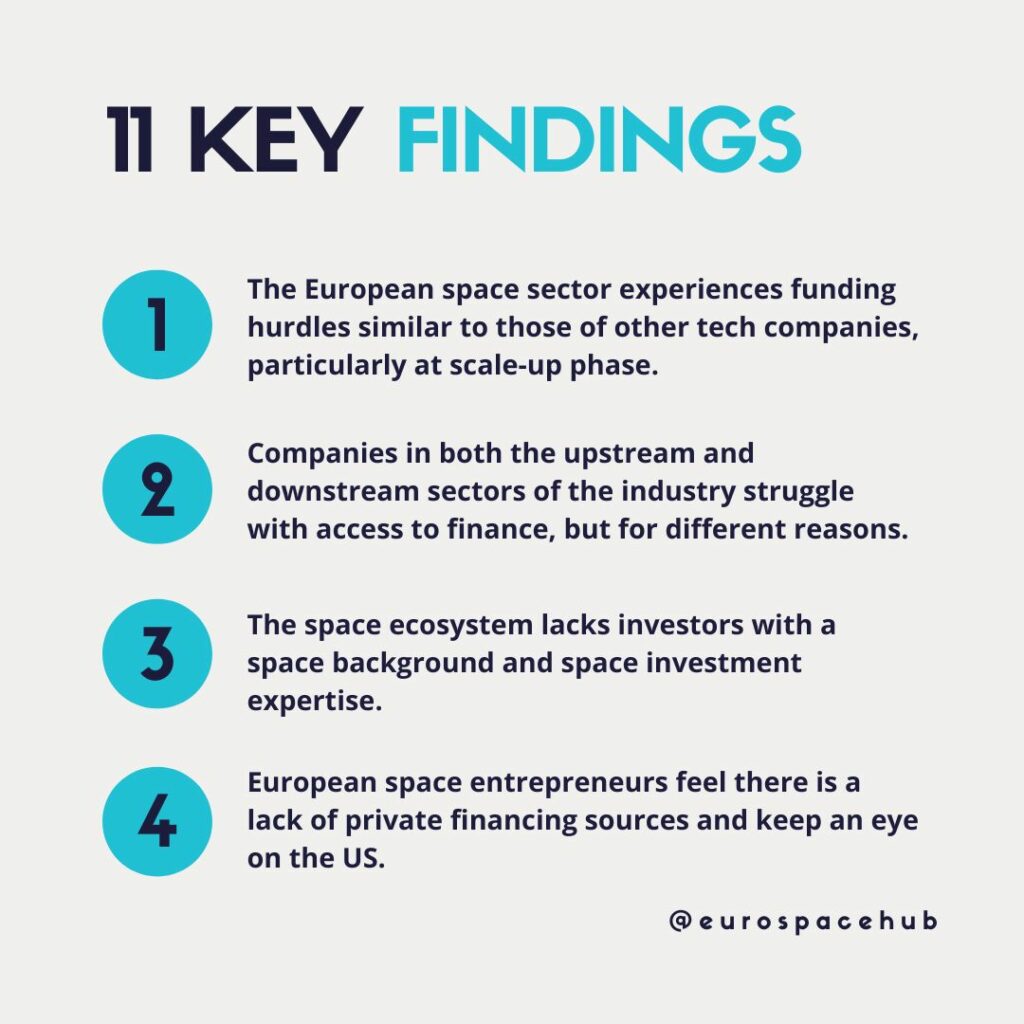
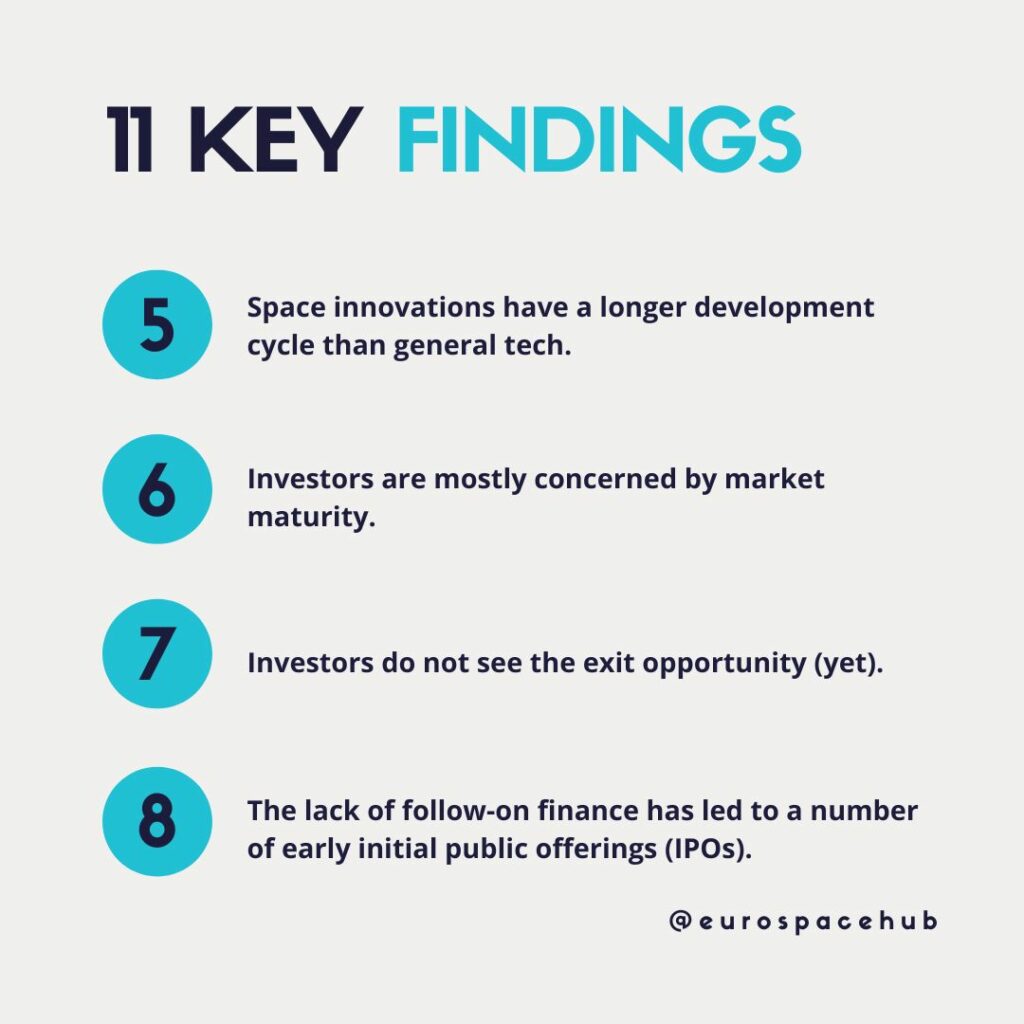
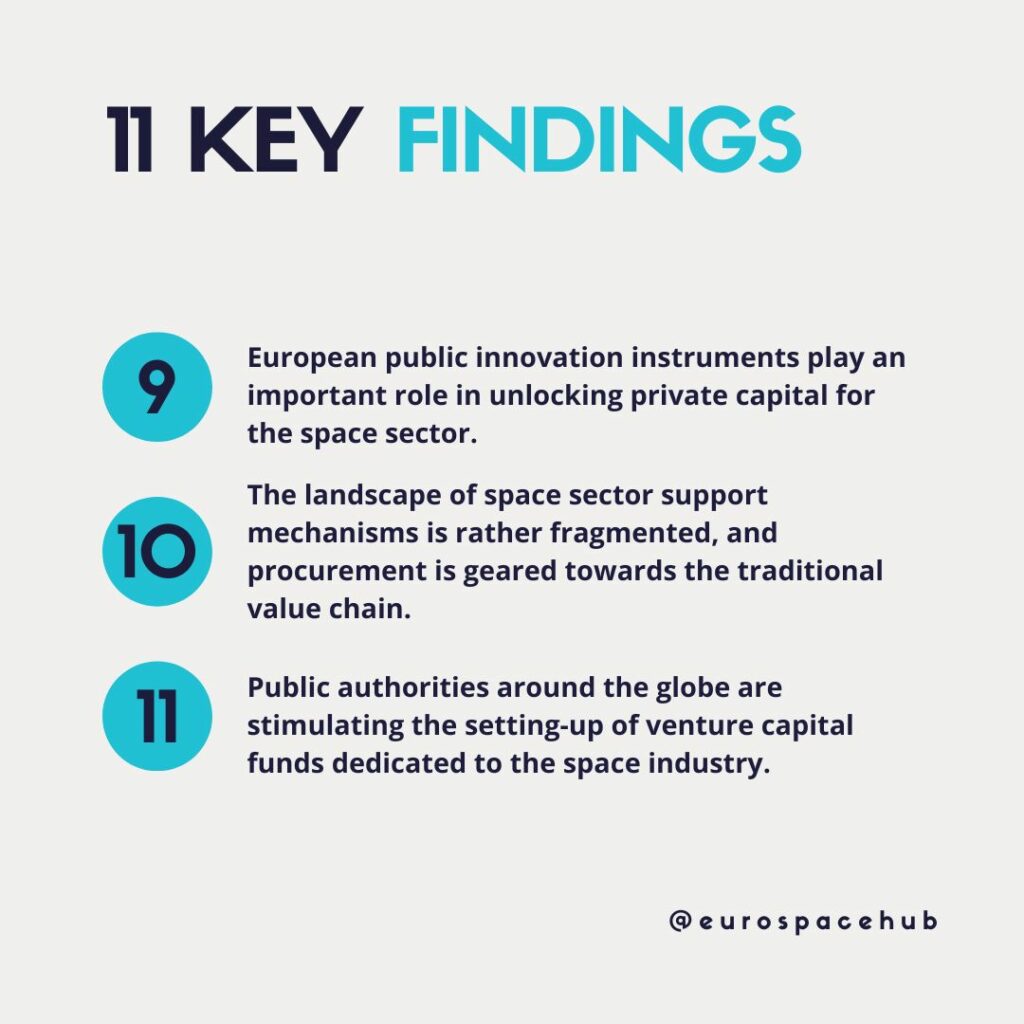
- The European space sector experiences funding hurdles similar to those of other tech companies, particularly at scale-up phase.
- Companies in both the upstream and downstream sectors of the industry struggle with access to finance, but for different reasons.
- The space ecosystem lacks investors with a space background and space investment expertise.
- European space entrepreneurs feel there is a lack of private financing sources and keep an eye on the US.
- Space innovations have a longer development cycle than general tech.
- Investors are mostly concerned by market maturity.
- Investors do not see the exit opportunity (yet).
- The lack of follow-on finance has led to a number of early initial public offerings (IPOs).
- European public innovation instruments play an important role in unlocking private capital for the space sector.
- The landscape of space sector support mechanisms is rather fragmented, and procurement is geared towards the traditional value chain.
- Public authorities around the globe are stimulating the setting-up of venture capital funds dedicated to the space industry.
Five recommendations
- Strengthen the ecosystem of public support mechanisms by introducing more flexibility and more commercial orientation.
- Develop and deploy innovative pull mechanisms from the public sector (e.g. innovative procurement and industrial policies) to stimulate technology development and its commercial uptake.
- Adopt a strengthened European defence policy as a driver for market development across all space business segments.
- Increase the volume of risk capital and catalyse additional private investment into the sector.
- Establish a ”finance for space“ forum with representatives from the finance community, academia, policymakers and industry to bridge the information gap and develop innovative financing solutions for the space sector.
Looking ahead to the future, Europe has a long way to go but is making rapid progress. Various ambitious financial proposals for the coming decade have been introduced by the EU Commission, including a €16 billion space programme, Horizon Europe-funded space research, investment schemes from InvestEU, and an emphasis on space in the upcoming European Union Framework Programme for Research and Innovation. If Europe truly wants to cement it’s role as a global competitor in the global space ecosystem, EU institutions will have to lead the way through innovative policies and business models that aim to reach ambitious goals, as to ultimately usher in a new era of New Space business for the continent.
Would you like to know more on this topic? Check the full report here:
ABOUT EUROSPACEHUB
EuroSpaceHub is a group of 5 founding members, VilniusTECH, International Space University, Complutense University Madrid, Lunex Foundation and Collabwith Group.
EuroSpaceHub aims to connect digitally the space ecosystem in Europe, from tech transfer offices to industry, space accelerator networks, research centres, and other universities. The project will allow these actors to easily connect with financial opportunities from the Horizon Europe framework, the venture capital programme, and the InnovFin initiative. EuroSpaceHub will bridge the gap between academic institutions and industry using a collaborative mindset and entrepreneurship programmes inside the universities connected through tech transfer offices.

EUROSPACEHUB IS FOUNDED BY VILNIUSTECH, INTERNATIONAL SPACE UNIVERSITY, COMPLUTENSE UNIVERSITY OF MADRID, COLLABWITH, LUNEX FOUNDATIONS AND FUNDED BY THE EIT HEI INITIATIVE LEAD BY EIT MANUFACTURING & EIT RAW MATERIALS.

